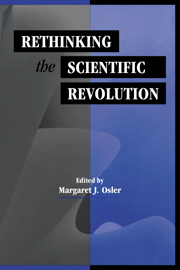1 - The Canonical Imperative: Rethinking the Scientific Revolution
Published online by Cambridge University Press: 25 October 2009
Summary
The Scientific Revolution is probably the single most important unifying concept in the history of science. Usually referring to the period from Copernicus to Newton (roughly 1500 to 1700), it is considered to be the central episode in the history of science, the historical moment at which that unique way of looking at the world that we call “modern science” and its attendant institutions emerged. It has been taken as the terminus ad quern of classical and medieval science and the terminus a quo of all that followed. Not itself an explanatory concept, the Scientific Revolution has become the reference point for questions that guide historians of science, questions about what it was, what exactly happened, why it happened, and why it happened when and where it did.
Traditional histories of the Scientific Revolution have customarily focused on a list of canonical individuals who explored a canonical set of subjects. The individuals usually include Copernicus, Tycho, Kepler, Galileo, Vesalius, Harvey, Descartes, Boyle, and Newton. The subjects are astronomy, physics, mathematics, anatomy, physiology, and chemistry. This book reflects the problematization of the canon in recent scholarship. The traditional canonical figures often devoted themselves to noncanonical subjects and frequently resembled many of their contemporaries who have not found a place in the Scientific Revolution's hall of fame. Moreover, the subjects that engaged their attention do not readily map onto the canonical list of modern sciences. Questioning the canon leads us to inquire why and how it was formed. And this inquiry, in turn, causes us to interrogate our own presuppositions as historians and how those presuppositions affect what we see in the past.
- Type
- Chapter
- Information
- Rethinking the Scientific Revolution , pp. 3 - 22Publisher: Cambridge University PressPrint publication year: 2000
- 11
- Cited by



